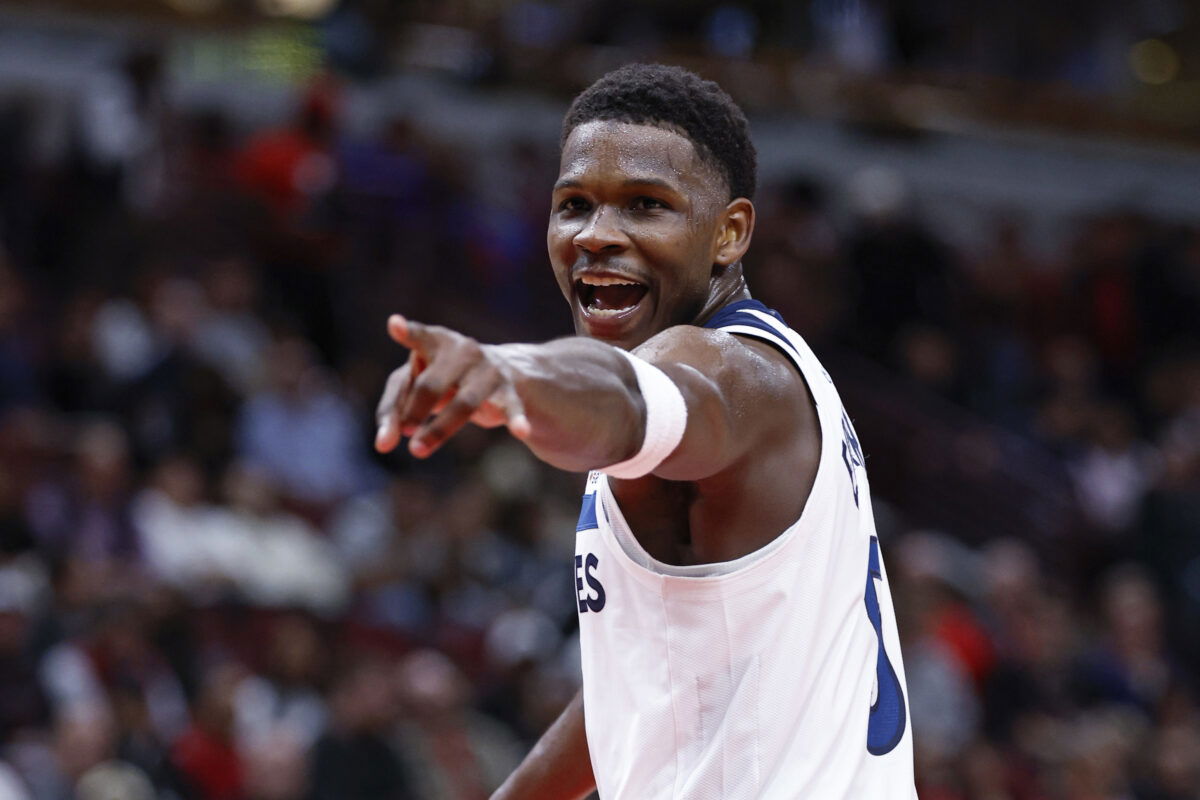
Imago
Nov 7, 2024; Chicago, Illinois, USA; Minnesota Timberwolves guard Anthony Edwards (5) reacts after scoring against the Chicago Bulls during the second half at United Center. Mandatory Credit: Kamil Krzaczynski-Imagn Images

Imago
Nov 7, 2024; Chicago, Illinois, USA; Minnesota Timberwolves guard Anthony Edwards (5) reacts after scoring against the Chicago Bulls during the second half at United Center. Mandatory Credit: Kamil Krzaczynski-Imagn Images

Imago
Nov 7, 2024; Chicago, Illinois, USA; Minnesota Timberwolves guard Anthony Edwards (5) reacts after scoring against the Chicago Bulls during the second half at United Center. Mandatory Credit: Kamil Krzaczynski-Imagn Images

Imago
Nov 7, 2024; Chicago, Illinois, USA; Minnesota Timberwolves guard Anthony Edwards (5) reacts after scoring against the Chicago Bulls during the second half at United Center. Mandatory Credit: Kamil Krzaczynski-Imagn Images
There are turning points in a season, and then there are moments that hard-reset a team’s soul. For the Minnesota Timberwolves vs. Lakers in Game 5, that moment wasn’t a buzzer-beater or a locker-room celebration. It wasn’t anything the cameras caught during postgame confetti or fourth-quarter heroics. According to Anthony Edwards, it came in Phoenix.
Watch What’s Trending Now!
It came when Julius Randle returned. “I think the time went for us was the game when Julius came back in Phoenix. I think that changed everything. We knew we needed him,” Edwards said, looking back on the stretch where the Wolves finally found themselves.
This wasn’t about a box score bump. It wasn’t about load management metrics or rotations on a whiteboard. It was about the kind of shift only teammates notice. One that recalibrates chemistry, accountability, and identity. “We was missing him, and we was just missing that that piece,” Randle said.
Anthony Edwards on how the Minnesota Timberwolves flipped the switch and sent the Lakers home
And as if on cue, another familiar face popped back into the lineup: Dante Exum. “Did Dante come back that game, too? Or no.” “He came, he came back right around the same time. Yeah.” So here’s the deal: Julius returns. Dante returns. And then boom! A team meeting. But not your basic sit-around-and-talk-it-out kind. This one came with a coach-led reality check. And Anthony just gave a step-by-step of how it went.
“So when they came back, it kinda changed everything,” Anthony Edwards said. “Like, our whole demeanor changed because we had, like, a team meeting with Finchy and the coaches, and, like, they got on us.” But instead of folding or getting defensive, the squad took it personally. In the best possible way.

“They feel like everybody responded the right way. Like, everybody went and looked in the mirror and said, you know, there’s a lot of things that I can do better for myself to help the team instead of trying to blame somebody.” What followed wasn’t just improved ball movement or sharper defense. What followed was identity. Grit. Clarity. The Wolves found themselves, and maybe more importantly, found a way to stop pointing fingers and start taking ownership.
“So we did that, and everybody became like a grown man in a sense. At right here,” Anthony Edwards said. That switch in mindset? It showed up in every 50-50 ball. In every scramble play. In every possession where they refused to let the Lakers breathe. While national headlines stayed glued to the LeBron-Jokic storyline and whether the Lakers had another miracle run left in them, the Timberwolves were over in the corner, loading the clip.
This wasn’t just about outplaying the Lakers. It was about finally becoming a team that believed in itself enough to do it. And that transformation started long before tip-off. It started when they got uncomfortable. You can talk all day about load management, spacing, and defensive schemes. But this stuff? This is what wins you series.
The Wolves didn’t need a trade deadline splash or a mid-season superstar to save them. They needed accountability. They needed their guys healthy. And they needed to man up when the mirror moment hit. And guess what? They got it all. So now, here we are.
The Lakers are done. The Wolves are still dancing. And if anyone’s still sleeping on what this team is becoming, wake up. This isn’t a Cinderella story. This is just a squad that stopped lying to itself. The Timberwolves looked in the mirror and liked what they saw. And now? They’re coming for everyone else’s reflection next.

